Are you aware of the immense potential of renewable energy in Africa? With a rapidly growing population and rising electricity demand, the continent is in dire need of sustainable energy sources. Fortunately, Africa is rich in natural resources such as solar, wind, and hydroelectric power, which can be harnessed to meet its energy needs.
Despite facing several challenges, such as a lack of infrastructure and financing, the renewable energy sector in Africa has been steadily growing in recent years. According to the International Energy Agency, renewable energy capacity in Africa is expected to double by 2030, with solar energy leading the way.
This growth is driven by a combination of factors, including the decreasing cost of renewable energy technologies, government policies, and private sector investments. As a result, renewable energy is becoming an increasingly attractive option for both large-scale energy projects and off-grid solutions in rural areas.
Current Energy Landscape in Africa
Africa is a continent with a rapidly growing population and an increasing energy demand. Unfortunately, the current energy landscape in Africa is dominated by traditional energy sources, such as coal and oil, which are not only environmentally damaging but also unreliable and expensive.
In this section, we will discuss the challenges faced by traditional energy sources and the opportunities for renewable energy in Africa.
Challenges Faced by Traditional Energy Sources
Traditional energy sources in Africa face several challenges, including:
-
- Limited Access: Many people in Africa still lack access to electricity, with an estimated 580 million people without access to electricity in 2020.
-
- Unreliable Supply: Traditional energy sources in Africa are often unreliable, with frequent blackouts and power outages.
-
- Environmental Damage: The use of traditional energy sources in Africa is causing significant environmental damage, including air and water pollution, deforestation, and the emission of greenhouse gases.
-
- Lack of investment: The renewable energy sector in Africa requires significant investment to grow and develop. However, the lack of access to finance is a major challenge for many African countries.
-
- Inadequate infrastructure: The lack of adequate infrastructure, such as transmission and distribution networks, is a major challenge for the development of renewable energy projects in Africa.
-
- Policy and regulatory barriers: The absence of clear policies and regulations is a significant barrier to the development of the renewable energy sector in Africa. This creates uncertainty for investors and makes it difficult for renewable energy projects to get off the ground.
-
- Intermittency of renewable energy sources: Renewable energy sources, such as solar and wind, are intermittent, which makes it difficult to integrate them into the grid. This requires the development of energy storage solutions to address the issue of intermittency.
Opportunities for Renewable Energy
Despite the challenges faced by traditional energy sources, Africa has enormous potential for renewable energy. Renewable energy sources, such as solar, wind, hydro, and geothermal, are not only environmentally friendly but also cost-effective and reliable. Some of the opportunities for renewable energy in Africa include:
-
- Abundant Resources: Africa has vast resource potential in wind, solar, hydro, and geothermal energy, which can be harnessed to meet the growing energy demand.
-
- Falling Costs: The costs of renewable energy technologies are falling, making them increasingly affordable and accessible to people in Africa.
-
- Socio-Economic Benefits: The transition to renewable energy in Africa can create new jobs, stimulate economic growth, and improve access to energy for people in rural areas.
The current energy landscape in Africa is dominated by traditional energy sources that are environmentally damaging, unreliable, and expensive.
However, there are significant opportunities for renewable energy in Africa, which can provide a sustainable, cost-effective, and reliable source of energy for the continent.
Renewable Energy Sources in Africa
Renewable energy is becoming increasingly important in Africa as the continent seeks to reduce its dependence on fossil fuels and increase access to electricity. There are several sources of renewable energy in Africa, each with its unique advantages and challenges.
Solar Energy.
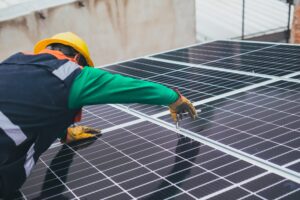
Solar energy is one of the most promising sources of renewable energy in Africa. The continent has abundant sunshine, which makes it an ideal location for solar power generation. Africa has some of the world’s greatest potential for solar power generation. The International Renewable Energy Agency (IRENA) estimates that Africa has a technical potential of 7,900 GW for solar photovoltaic (PV) power generation.
Several African countries are already investing in solar energy. For example, Morocco has built one of the world’s largest solar power plants, the Noor-Ouarzazate complex, which has a capacity of 580 MW. South Africa is also investing in solar energy, with the country’s Renewable Energy Independent Power Producer Procurement Program (REIPPPP) supporting the development of several large-scale solar power plants.
Wind Energy.

Wind energy is another promising source of renewable energy in Africa. The continent has several areas with strong wind resources, particularly along the coastlines and in the highlands. According to the African Development Bank (AfDB), Africa has a potential capacity of 110 GW for wind power generation.
Several African countries are already investing in wind energy. For example, Egypt has built several large-scale wind power plants, including the 580 MW Gulf of Suez wind farm. Kenya is also investing in wind energy, with the country’s Lake Turkana Wind Power project, which has a capacity of 310 MW.
Hydropower.
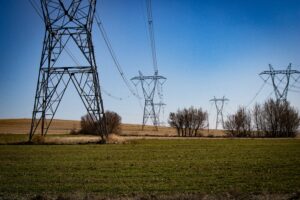
Hydropower is the largest source of renewable energy in Africa, accounting for about 16% of the continent’s electricity generation. Africa has several large rivers, including the Nile, Congo, and Zambezi, which have the potential for large-scale hydropower generation.
Several African countries are already investing in hydropower. For example, Ethiopia has built several large-scale hydropower dams, including the Grand Ethiopian Renaissance Dam, which has a capacity of 6,450 MW. Zambia is also investing in hydropower, with the country’s Kafue Gorge Lower hydropower project, which has a capacity of 750 MW.
Geothermal Energy.

Geothermal energy is a promising source of renewable energy in Africa, particularly in the East African Rift System, which runs from Djibouti to Mozambique. The region has several active volcanoes, which provide a source of geothermal energy.
Several African countries are already investing in geothermal energy. For example, Kenya has built several geothermal power plants, including the Olkaria I and II plants, which have a combined capacity of 280 MW. Ethiopia is also investing in geothermal energy, with the country’s Aluto-Langano geothermal project, which has a capacity of 70 MW.
Biomass Energy.
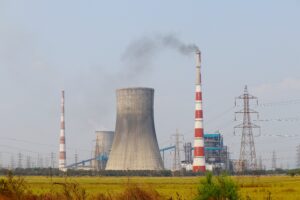
Biomass energy is a traditional source of energy in Africa, particularly in rural areas. It involves the use of organic materials, such as wood, crop residues, and animal waste, to generate heat and electricity.
Several African countries are already investing in biomass energy. For example, Ghana has built several biomass power plants, including the 20 MW Kpong Biomass Plant. Tanzania is also investing in biomass energy, with the country’s Bagamoyo Sugar Company planning to build a 34 MW biomass power plant.
Barriers to Renewable Energy Adoption in Africa
Despite the potential benefits of renewable energy, there are several barriers to its adoption in Africa. Here are some of the challenges:
-
- Lack of financing: Financing renewable energy projects can be challenging, particularly for small-scale projects and in countries with weak financial systems.
-
- Lack of infrastructure: The lack of adequate transmission and distribution infrastructure can limit the deployment of renewable energy technologies in remote areas.
-
- Policy and regulatory barriers: The absence of supportive policies and regulations can hinder the growth of renewable energy markets in Africa.
-
- Limited technical capacity: The lack of technical expertise and skilled labor can limit the deployment of renewable energy technologies in Africa.
Different business opportunities exist in renewable energy.
Installation:

-
- Businesses can install solar panels, wind turbines, or other renewable energy systems for residential or commercial customers.
-
- Potential for growth as more people and businesses seek to reduce their carbon footprint and save money on energy costs.
Maintenance:

-
- Businesses can provide maintenance and repair services for renewable energy systems.
-
- Potential for recurring revenue as customers requires ongoing maintenance to keep their systems running smoothly.
Consulting:

-
- Businesses can provide consulting services to help customers determine the best renewable energy solutions for their needs.
-
- Potential for high-profit margins as consulting services can be billed at a premium rate.
Manufacturing:
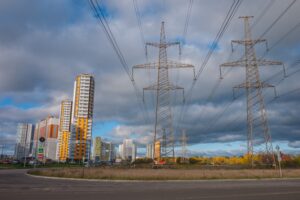
-
- Businesses can manufacture renewable energy products such as solar panels, wind turbines, or batteries.
-
- Potential for growth as demand for renewable energy products increases.
Energy Storage:
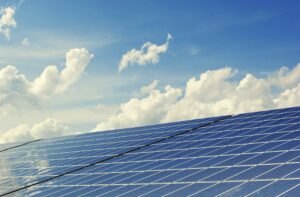
-
- Businesses can provide energy storage solutions such as batteries, pumped hydro storage, or thermal storage.
-
- Potential for growth as renewable energy sources such as solar and wind are intermittent and require energy storage to provide a consistent supply of energy.
Energy Efficiency:

-
- Businesses can provide energy efficiency solutions such as energy audits, retrofitting, and smart home technology.
-
- Potential for growth as energy efficiency is a key component of reducing energy consumption and greenhouse gas emissions.
Overall, the potential for each business opportunity in renewable energy is significant as the demand for renewable energy solutions continues to grow. By tapping into these opportunities, entrepreneurs can not only make money but also contribute to a more sustainable future.
Fun fact.
Did you know that the world’s largest solar power plant, the Bhadla Solar Park in India, spans over 14,000 acres and can power over 150,000 homes? That’s equivalent to powering a small city with just one solar power plant! Renewable energy solutions like solar power are not only environmentally friendly but also have the potential to provide clean and affordable energy to millions of people around the world. As entrepreneurs tap into the potential of renewable energy, we can look forward to more innovative solutions and exciting developments in the industry.
Conclusion
Renewable energy is a rapidly growing industry with abundant business opportunities for entrepreneurs. From installing solar panels to manufacturing wind turbines and providing energy storage solutions, there are countless ways for entrepreneurs to tap into the potential of renewable energy and make a positive impact on the environment and society.
As the world continues to shift towards renewable energy sources, entrepreneurs who embrace this trend will be well-positioned to take advantage of the many opportunities that lie ahead. By investing in renewable energy, entrepreneurs can not only make money but also contribute to a more sustainable future for generations to come.





